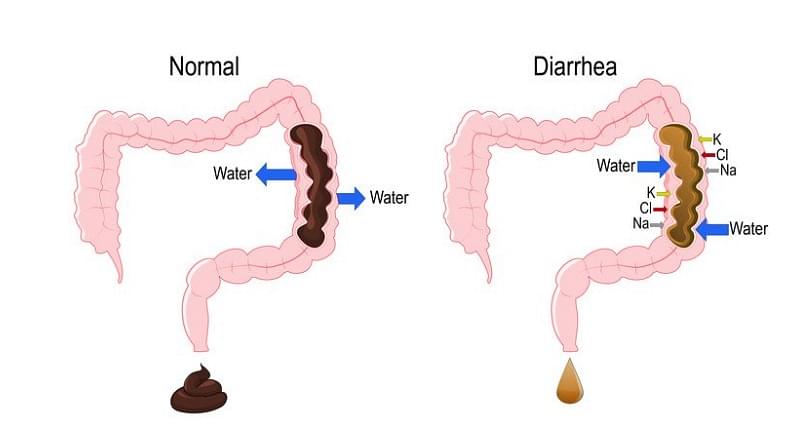Infections are one of the most common causes of diarrhea. They can be caused by viruses, bacteria or parasites. Viral infections such as rotavirus or norovirus are highly contagious and are usually spread through contaminated food or water, as well as direct contact with an infected person. Bacterial infections such as Salmonella, E. coli and Campylobacter are usually transmitted through contaminated food or water. Parasites such as Giardia lamblia can also cause diarrhea, especially when traveling to countries with lower hygiene standards.
Food intolerance is another important cause of diarrhea. Unlike food allergies, food intolerances do not involve the immune system, but are usually the inability of the digestive system to properly digest certain foods or their components. Lactose intolerance is one of the most common intolerances in which the body does not have enough of the lactase enzyme needed to break down milk sugar. This can cause bloating, pain and diarrhea after consuming dairy products. Other food intolerances may include intolerance to fructose, gluten (despite celiac disease) and artificial sweeteners such as sorbitol.
In addition to infections and food intolerances, there are other causes of diarrhea, including medications, especially certain antibiotics, which can disrupt the balance of intestinal microflora, causing diarrhea. Also, various diseases of the gastrointestinal tract, such as Crohn's disease, ulcerative colitis and various functional bowel disorders, can cause diarrhea as a symptom.
It is important to emphasize that while most cases of diarrhea are mild and self-limiting, prolonged or severe diarrhea can lead to dehydration and mineral imbalances. Therefore, when dealing with prolonged or severe diarrhea, it is necessary to consult a health care professional for a thorough evaluation and, if necessary, appropriate treatment.

Restoring fluid and electrolyte balance in diarrhea is vital because diarrhea can cause rapid and significant dehydration and electrolyte imbalance. Diarrhea, which is characterized by increased frequency of bowel movements and loose or watery stools, leads to significant loss of water and electrolytes (such as sodium, potassium, chloride, and bicarbonate). These components are necessary for normal cell functioning, transmission of nerve impulses, muscle contraction and pH balance.
Dehydration resulting from insufficient fluid intake or excessive fluid loss can lead to serious health problems, including a drop in blood pressure, heart rhythm problems, kidney failure, and, in the most severe cases, a state of shock. Therefore, when faced with diarrhea, it is important to immediately take measures to restore fluid and electrolyte balance.
Rehydration can be accomplished by drinking more water, fruit juice (be careful, as some juices, such as apple or grape, can aggravate diarrhea), and/or special rehydration solutions. These solutions, usually sold in pharmacies, are specially formulated to restore electrolyte balance and are more effective than plain water by helping to replace lost electrolytes such as sodium and potassium.
In addition to the drinks, it is also important to review the diet. While it is recommended to avoid foods during diarrhea that may further irritate the gut or cause additional fluid loss, it is important to consume foods that help restore electrolyte balance, such as bananas, boiled potatoes, and soup.
When diarrhea is severe or prolonged, intravenous fluids and electrolytes may be needed, especially if the person is severely dehydrated or at risk of complications from dehydration. In this case, urgent medical help is necessary.
Restoring fluid and electrolyte balance not only reduces the risk of dehydration and related complications, but also improves the patient's overall well-being. It also helps the body recover more quickly from episodes of diarrhea, allowing you to return to your normal activities sooner. Therefore, proper hydration and electrolyte replacement practices are essential when dealing with diarrhea to prevent serious health problems.
Prevention is key to preventing diarrhea, which can be caused by a variety of factors, including infections, food intolerances, and poor food safety. Effective preventive measures include strict personal hygiene, attention to food preparation and storage, as well as conscious choice of food products. These measures can help reduce the incidence of diarrhea and prevent diarrhea-related complications.
By following these preventive measures, it is possible to significantly reduce the risk of diarrhea and avoid complications related to it, thus ensuring better health and quality of life.
:max_bytes(150000):strip_icc()/causes-of-diarrhea-sudden-or-chronic-1324505-5bb7c1e8c9e77c0026b0f77a.png)
# viduriavimas